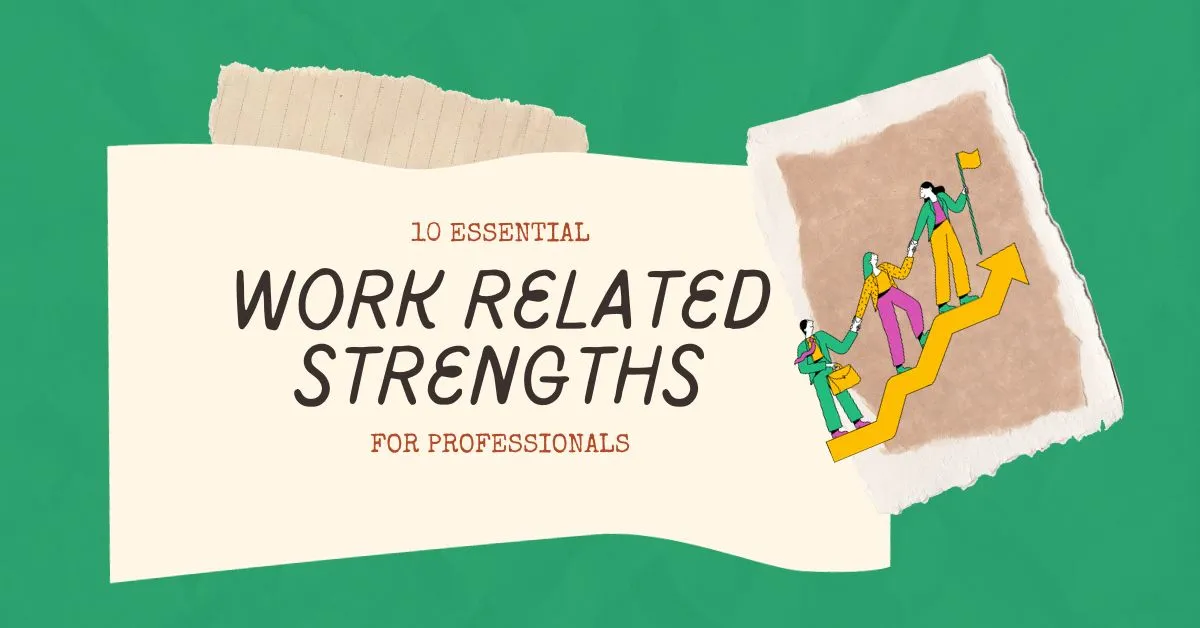
10 Essential Work Related Strengths for Professionals
What are work-related strengths? Why do we need them? How to develop them? Do you have all these questions in mind? If yes, let's clarify them in this comprehensive article. Nowadays, businesses are completely different than the traditional ones. It rapidly changes and utilizes sophisticated, innovative technologies and trending methods that can change the way they operate.
Because of this rapid change, professionals must have diversified work-related strengths to perform their jobs in tip-top conditions. These strengths can help them become established players in the organization. Moreover, understanding and implementing them in work practices significantly impact the performance and career advancements of professionals.
Key Takeaways
- Understand the top 10 crucial work-related strengths, their importance for performing the job, and tips for improving them.
- Learn the crucial methods of identifying work strengths including self-assessment tools, feedback, and self-reflection.
- Understand the methods of developing and enhancing employee skills including learning and mentorship.
- Discover how leveraging professional strengths can enhance career performance, leading to promotions, incentives, and organizational benefits.
- Explore practical tips and real-world examples to develop key employee strengths such as adaptability, communication, problem-solving, leadership, teamwork, etc.
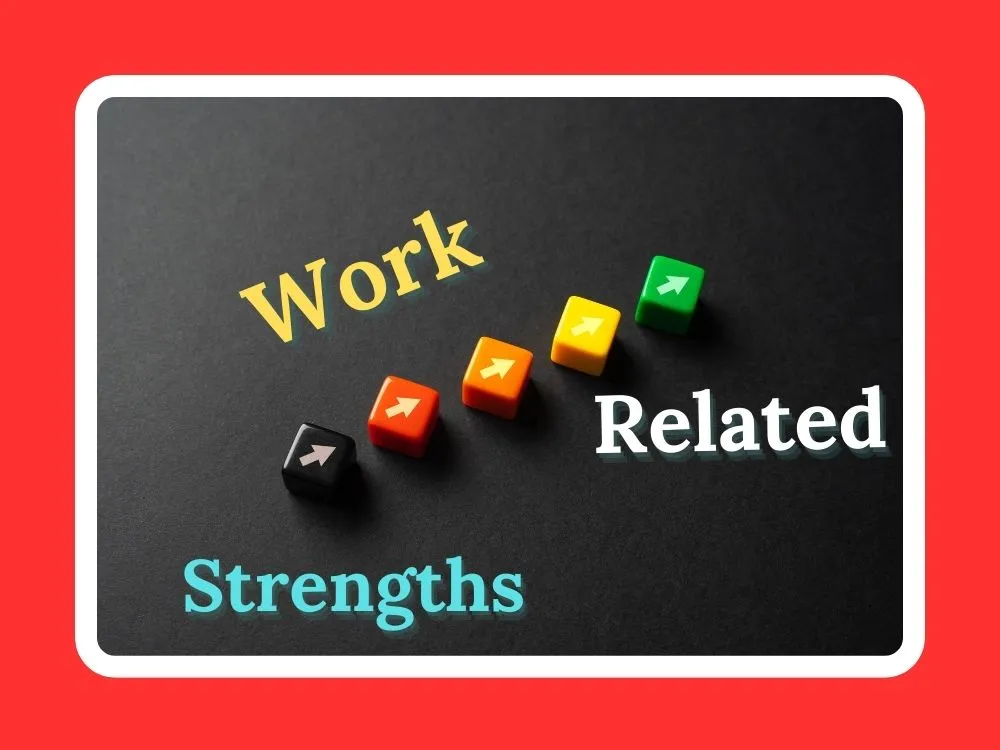
Employees can enhance their capabilities by focusing on these essential work strengths. Plus, they can stand out in their respective fields and navigate the challenges of the modern workplace with confidence. Therefore, these strengths are prominent for every professional for a successful career and growth.
Common Strengths for Professional Growth and Success
To ensure professional growth and success, it's essential to have different types of work strengths which can include the following:
- Adaptability
- Effective Communication
- Problem-Solving Skills
- Leadership
- Teamwork and Collaboration
- Time Management
- Resilience
- Critical Thinking
- Initiative
- Creativity and Innovation
Apart from these important employee strengths, professionals require other related skills that could help them grow and succeed in their professional journey. Employees need to acquire these necessary strengths through proper learning, experience, and guidance.
The Power of Work-Related Strengths
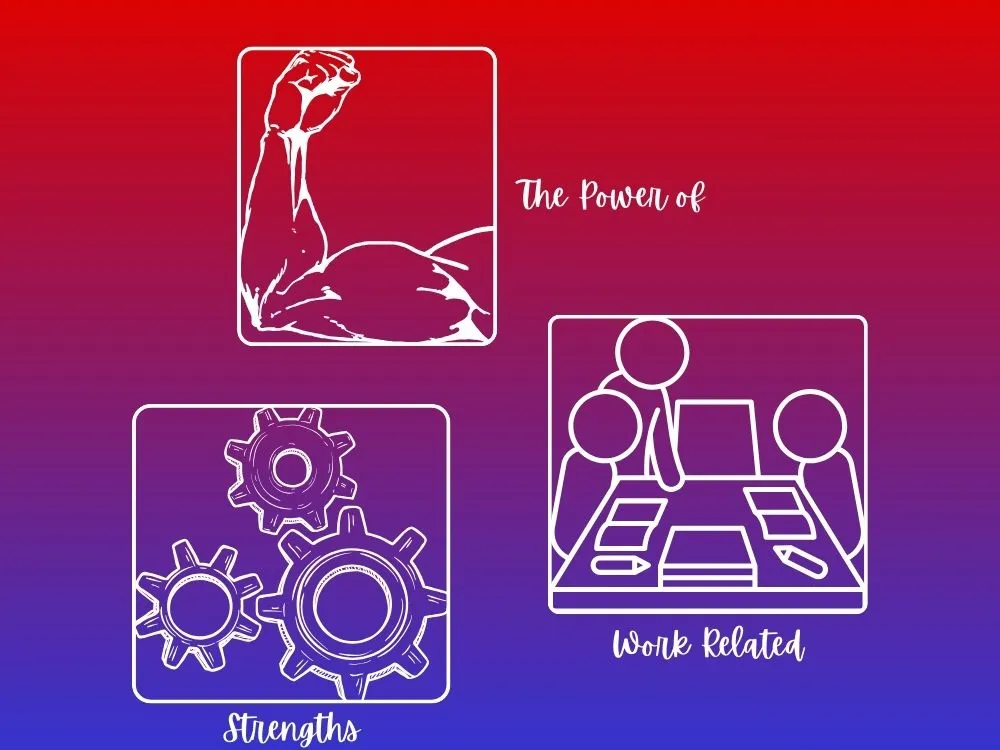
What are Work Related Strengths?
Simply, we can define them as the unique qualities that individuals have to perform well in their respective job areas. These strengths can be a supportive factor in enhancing the work quality and overall productivity of an organization.
Professionals may have different kinds of skills. Personal attributes like resilience and a positive attitude also contribute to their strengths. Emotional intelligence, encompassing self-awareness and empathy, is another key aspect.
Top 10 Work-Related Strengths
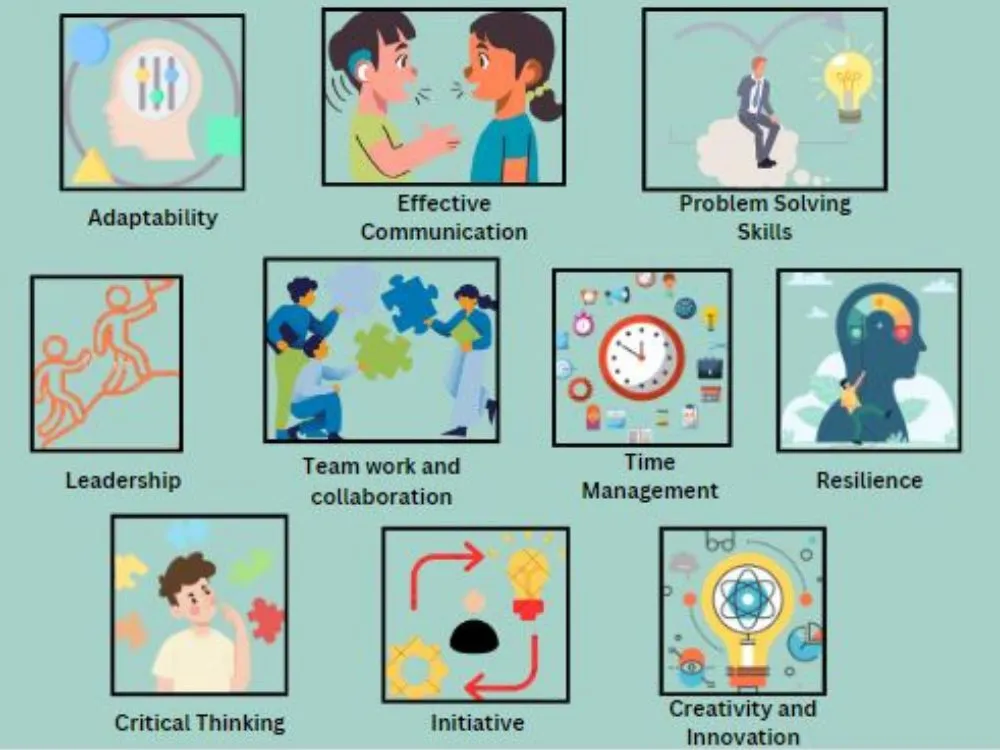
A) Strength 1- Adaptability
Adaptability is one of the most prominent strengths a professional should have. This particular thing can make the person fit for organizational changes whether it's a new implementation of technology, a different work system or any other internal change.
Professionals must develop this strength because without adaptability it will be tough to survive in the competitive market. Also, this work strength is crucial to performing critical work-related tasks effectively and up to the required standard level.
Real-world examples of adaptable professionals
- Elon Musk - Elon Musk is the brain behind Tesla and SpaceX. He has developed adaptability strength which helped him revolutionize the electric car industry and launch rockets into space, Musk constantly adapts to cutting-edge technologies and unforeseen challenges.
- Oprah Winfrey - Oprah Winfrey is a famous media queen who showcases adaptability throughout her career. From talk show host to media mogul, she smoothly transitioned her career path, proving her to be open to change which led to unparalleled success.
- Tim Cook - As Apple's CEO, Tim Cook has successfully navigated the tech giant through various market shifts. His ability to adapt to the company's strategy and products to meet evolving consumer needs is a testament to the power of adaptability at the highest corporate levels.
These real-world examples highlight how adaptability isn’t just a term, but it's a trait that fuels success in diverse fields and industries. Learning from these adaptable professionals can inspire anyone to embrace change as a stepping stone to greatness.
B) Strength 2- Effective Communication
Effective communication is the key to an efficient work process. So, employees should develop this strength. Without clear communication, there will be several issues in understanding the work-related tasks which can affect the quality of the work.
Moreover, communication gaps will lead to inefficiencies and take more time for the work to be completed. Professionals who have the power to effectively communicate in team meetings, personal task allocation, and other important scenarios can able to improve the work quality. So, that every individual will be able to understand the concept easily.
Tips for improving communication skills
There can be several tips for improving the communication skills of an individual. Let’s discuss some of the vital tips below:
- Active Listening: This is crucial because listening is so important to understand what exactly the opposite person conveys. Paying full attention and maintaining proper eye contact with minimal distractions is crucial in active listening. When you listen to things carefully, you are halfway through completing the tasks they require. So active listening is so important for improving communication skills.
- Clear and Concise Expression: It's always good to interpret stuff concisely and precisely to the point without unnecessary jargon. This way, an individual clearly explains things to another person (s). So, this can be a good approach for improving communication skills.
- Body Language: When it comes to effective communication, body language is an important factor. Maintaining a proper gesture is crucial for transferring the message accurately. So, to improve communication skills, professionals need to consider their body language.
- Continuous Learning: Do you know why there are communication issues? It’s because the person lacks knowledge of the subject matter he speaks about. So, thorough preparation and learning are mandatory to improve communication skills on the subject matter.
There could be other methods that can be efficient in improving communication skills like establishing icebreaker questions in workplace contexts such as new hire onboarding, team meetings, etc. So, professionals need to have an eye on them to enhance their communication and uphold organizational values.
C) Strength 3- Problem-Solving Skills
In organizations, conflicts and complaints are common. However, professionals must have good conflict management or problem-solving skills to fix all problems successfully.
Therefore, problem-solving is one of the valuable employee strengths that every professional should build. Also, this skill is essential to reduce workers' complaints, improve customer satisfaction, enhance operational conditions, and many other things.
Steps for problem-solving
- Define the Problem Clearly: You should begin by defining the problem clearly and concisely. Break it down into smaller components to understand its core elements. This step sets the foundation for effective problem-solving.
- Gather Relevant Information: Collect pertinent information related to the problem. Research, gather data, and seek insights that will aid in better understanding the context and potential solutions.
- Generate Multiple Solutions: Encourage creative thinking by generating a variety of possible solutions. Avoid settling for the first idea that comes to mind. Diverse options provide a broader perspective on tackling the problem.
- Evaluate and Prioritize Solutions: Assess each potential solution based on its feasibility, impact, and alignment with your goals. Prioritize options by considering their practicality and potential positive outcomes.
- Implement the Chosen Solution: Once you have selected the most viable solution, take action. Implement the chosen strategy and monitor its progress. Be flexible and ready to adjust the plan if needed.
- Learn from the Process: Reflection is crucial for continuous improvement. After solving a problem, take time to evaluate the process. What worked well? What could be done differently next time? Learning from each experience enhances future problem-solving abilities.
D) Strength 4- Leadership
Leadership is a prominent strength for professionals. Good leadership brings many benefits to the organization. Therefore, professionals have to build adequate leadership qualities that directly support professional growth.
Good and ethical leadership positively changes the working culture. Plus, it ensures that employees feel valued at the organization. It's also a crucial factor in improving employee productivity. When productivity increases, it will increase profitability and other essential benefits.
Developing leadership skills in the workplace
To develop leadership skills, every professional should follow certain things, which have been mentioned below:
- Set Clear Goals
- Effective Communication
- Lead by Example and take accountability
- Encourage Team Collaboration
- Adaptability and Decision-Making
- Continuous Learning
- Empathy and Emotional Intelligence
- Delegate Effectively
- Conflict Resolution
- Recognition and Appreciation
E) Strength 5- Teamwork and Collaboration
Teamwork and collaboration are effective work strengths that let professionals complete tasks quickly, bring new and innovative ideas to the table, enhance employee engagement, and provide many other crucial benefits.
Teamwork helps individuals to plan tasks properly and divide work tasks relevant to the person’s skills. So, the work is completed simply and efficiently compared to the individual approach to performing the work.
Building a collaborative work environment
Building a collaborative working environment is the employer’s responsibility where individuals can practice the work-related tasks within their boundaries. Team dynamics are crucial for the workers to collaborate well and perform certain tasks.
For example, a facility maintenance department can collaborate with the procurement department. Facility maintenance professionals require quick and easy procurement of maintenance supplies for conducting their work. This collaboration helps ensure quick work completion.
F) Strength 6- Time Management
Without a doubt, time is a very important factor in business organizations. This is because every minute has money-generating potential. Inefficient time management leads to potential losses and ultimate business failure.
Professionals should have the necessary time management skills which can showcase their ability to complete tasks on time. They should be punctual and properly plan their tasks relevant to the time it requires.
When jobs are completed on time, it will help increase productivity with minimal breakdowns and reduce wastages and production losses. Also, employees should consider developing time management skills to make things effective.
Practical time management tips for professionals
The following practical tips help develop time management skills for professionals:
- Prioritize Tasks: Identify and prioritize tasks based on urgency and importance. Focus on high-priority jobs to ensure critical objectives are met first.
- Use Time Blocks: Allocate specific time blocks for different activities. This approach helps minimize multitasking and enhance concentration. This makes you more efficient in completing tasks.
- Set Realistic Goals: Establish achievable goals to avoid overwhelm. Break down larger tasks into smaller, manageable steps and make it easier to track progress and maintain motivation.
- Limit Distractions: Minimize interruptions by turning off non-essential notifications, setting specific periods for email and social media checks, and creating a dedicated workspace to boost concentration.
- Learn to Delegate: Recognize tasks that can be delegated to others. Delegating responsibilities will empower team members and allow you to focus on tasks that align with your expertise and priorities.
G) Strength 7- Resilience
Resilience is another crucial work-related strength for professionals that helps individuals to bounce back from difficult situations. It's a superpower that enables professionals to withstand certain circumstances.
In organizations, it's common that certain challenges and adverse situations tend to shake workers. For example, discrimination is a challenge employees face in specific situations where resilience is an important employee strength to overcome this challenge.
Similarly, other occupational challenges like inadequate welfare provisions, long work hours, less appreciation, partiality, low wages, and other related problems are causing imbalances in workers' minds. So, they need a strong, resilient power to withstand these changing situations.
Tips to improve resilience strength for professionals
- Develop a Growth Mindset: By developing a mindset for continuous growth, professionals can easily eradicate challenges and issues. It's good to view challenges as opportunities that help build resilience.
- Practice Self-care: Self-care practices are good allies to improve resilience. Professionals should focus on exercising, meditation, relaxation, and mindfulness training. These things help build resilience.
- Look out for Support: Seek support from working and non-working friends, family members, well-wishers, and mentors. They help you through encouragement, motivation, and with some positive words in difficult times. This works well to improve resilience. Plus, sharing work-related memes can also reduce stress or burnout in workplaces.
- Develop Problem-solving Skills: Professionals must improve their problem-solving ability to tackle problems. This can help build resilience through proactive solutions.
H) Strength 8- Critical Thinking
Critical thinking is the ability to analyze and evaluate a situation efficiently. This helps make informed business decisions. Cultivating this work strength is crucial and it lets professionals think out of the box in navigating problems and make sound judgments at the organization.
Critical thinking allows professionals to question, explain, and draw meaningful conclusions. Just think about it, if professionals don’t have this skill, they might just jump into making judgments without questioning and analyzing.
If decisions are made without proper analysis or critical thinking, then there may be chances for failure in the decisions. Always sharpening their critical thinking ability is crucial for professionals to improve their strategic excellence.
Exercises to improve critical thinking skills
- Ask Questions: It's better to ask questions about why you believe, what you do. Challenge your thoughts by asking "Why" and "How" to dig deeper into your reasoning.
- Solve Problems: Tackle puzzles or real-world challenges to practice analyzing situations, considering solutions, and evaluating their effectiveness.
- Join Discussions: Engage in debates or discussions to find out different viewpoints. This may help refine your ability to analyze and counter opposing ideas.
- Read Widely: Read from various genres and cultures to expose yourself to different ways of thinking. Analyzing diverse content can broaden your analytical skills.
- Mind Mapping: Use mind maps to visually organize your thoughts. This helps you see connections between ideas and improve analytical and strategic thinking.
- Explore Case Studies: Work through real-world cases related to your interests or profession. This practical exercise can sharpen your critical thinking in specific contexts.
- Take Courses: Enroll in critical thinking courses to get structured guidance and exercises. Online platforms offer convenient learning to strengthen your analytical capabilities.
I) Strength 9- Initiative
The initiative is an important strength that propels individuals to take action without waiting for instructions. It's about identifying opportunities, setting goals, and driving positive change. Professionals who have a strong sense of initiative are proactive problem solvers and innovative thinkers.
They don't just wait for instructions from other people to come from, but they actively seek ways to improve and contribute. In organizations, initiative is the crucial work-related strength that fuels personal and organizational growth. So, embracing initiative as a strength can be your ticket to turning ideas into impactful actions.
Some real-life examples of great initiatives
Let's see some real-life initiatives that made positive changes to their organizations:
- Google's 20% Time: Google's "20% Time" initiative allows employees to spend 20% of their work hours on personal projects. This initiative led to the creation of innovative products like Gmail and Google News which emphasized the impact of employee-driven initiatives.
- Greta Thunberg's Climate Activism: Greta Thunberg's climate activism started with a personal initiative, skipping school to protest outside the Swedish Parliament. Her grassroots movement grew into a global initiative that inspired millions to take action on climate change.
J) Strength 10- Creativity and Innovation
Creativity and innovation are superpowers that make more room for development and productivity. Professionals need to have these work strengths where innovation and creativity let them find an easy way to work and enhance work efficiency.
Employees get easy solutions to do things at the organization when these strengths are there. For example, an innovative solution like a building management system can automate maintenance tasks and save huge energy rather than performing the maintenance work manually.
So, employers must give importance to developing their employees’ creativity and they should motivate them to think outside the box. This effectively helps bring new innovative ideas to simplify the work. If there is no creativity, then there will be no room for innovation.
Tips for professionals to enhance creativity and innovation
- Explore New Perspectives: Professionals should try out new hobbies or activities outside of work to fetch fresh ideas and inspire creativity.
- Learn from Mistakes: Professionals need to learn from their mistakes which effectively helps avoid the recurrence of issues. Plus, they have to constantly learn and grow to encourage experimentation and innovation.
- Team Up for Ideas: By collaborating with innovative individuals from other teams or departments, professionals can improve their creative and innovative skills.
- Take Time to Think: Employees shouldn't rush into completing things. They should dedicate enough time to brainstorming and reflection to generate innovative ideas without distractions.
- Stay Curious: Keep asking questions and exploring new concepts to boost creativity and drive innovation at work.
Developing and Enhancing Your Work Strengths
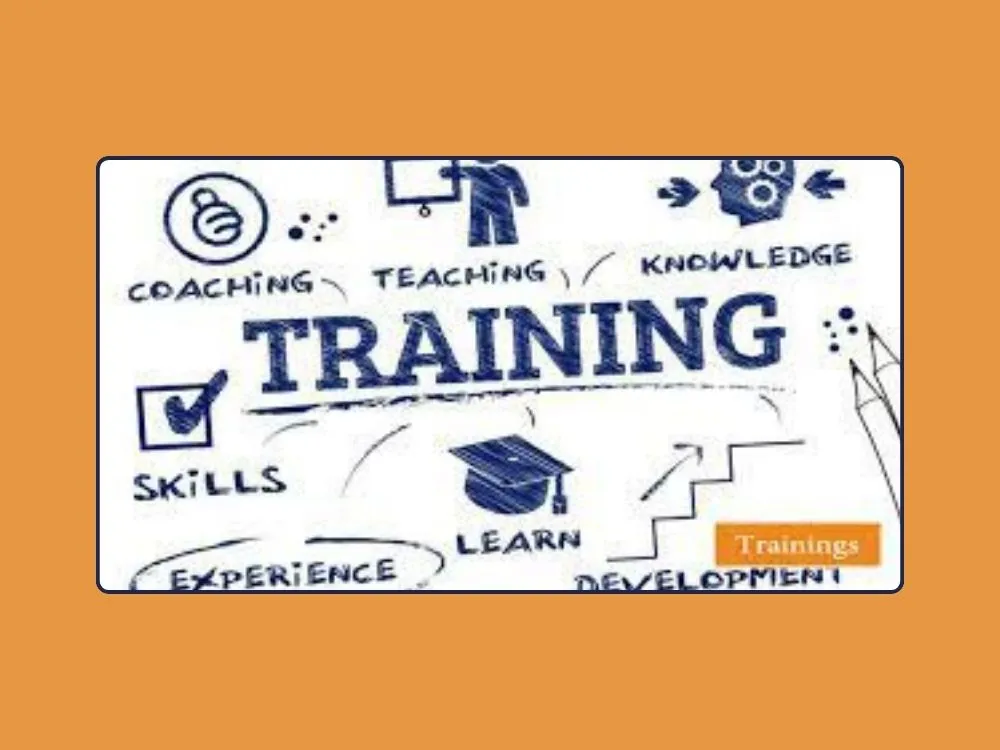
Continuous Learning and Professional Development
Knowledge is an ocean, the more we learn the more we get. Professionals should consider continuously learning new things that sufficiently help them gain important knowledge in work-related subject matters.
Sometimes we may learn from failures. In organizations, there are several chances for mistakes to happen, and it's essential to learn what went wrong and how it can be fixed. This learning approach helps avoid issues in the future.
There can be multiple sources for learning things. Joining team meetings, webinars, reading books, and getting the help of open sources like the rural internet options are some effective ways to get the information we need.
Nowadays, information is everywhere and it is the sole responsibility of professionals to search for it. Gaining essential knowledge lets the employees master the subject matter which can be a great asset for company growth.
Career development is only possible when professionals master performing the work. Without learning the essential things, it is not possible to expect professional advancement. Since these reasons are vital to consider, it is a mandatory requirement to learn continuously and it has no end, “every day is a new day that teaches you something”.
Seeking Mentorship and Guidance for Personal Growth
Seeking professional mentorship and guidance will lead to personal growth. Individual employee strengths are varied and some people are good at something, where some aren’t. So, what is the solution to acquiring the necessary knowledge that you don’t have?
It is so simple, getting ideas, mentorship, coaching, and guidance programs from the experts can be an effective solution to develop your skills in the subject matter.
Many organizations arrange coaching and learning programs to educate employees and they know the value of this approach. Employees get the necessary skills from mentorship programs and this will help them grow by a great percentage and professionally conduct work.
How Leveraging Employee Strengths Enhances Career Performance?
When professionals discover their strengths and leverage them in their work, it will positively enhance their career performance. It's crucial to improve individual career performance by setting smart goals. This approach is also helpful for employee performance appraisals.
Moreover, employees can only be able to achieve their career targets by gaining proper and relevant work-related skills. They are effective and helpful in boosting their career performance. This approach brings several benefits to the individual employees and the organization.
Employees get promotions, incentives, bonuses, salary increments, and several other benefits when they achieve their career targets. Plus, organizations benefit through the achievement of goal setting and productivity enhancements.
Identifying Your Work Strengths
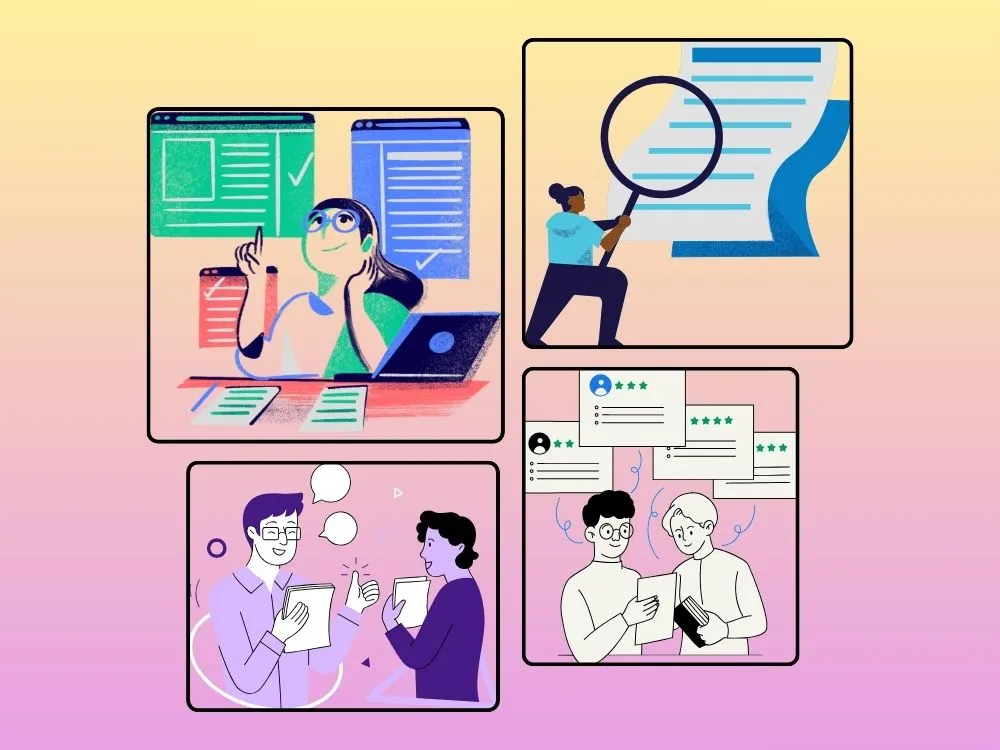
Self-Assessment Tools and Techniques
Some user-friendly self-assessment tools and techniques serve as guides in finding your unique strengths. Plus, they provide a deeper understanding of how you can excel in your professional journey. Let's find out the most common ones:
- Online Personality Assessments: Explore tools like the Myers-Briggs Type Indicator (MBTI) or StrengthsFinder for insights into your personality traits and professional strengths.
- Reflective Practices: Engage in journaling and seek feedback from peers and mentors. Regularly reflect on your accomplishments and challenges to identify patterns in your skills and attributes.
The Role of Feedback and Self-Reflection in Recognizing Employee Strengths
Feedback and self-reflection play a pivotal role in recognizing professional strengths. Getting feedback from work colleagues, mentors, and other individuals is helpful to understand the employee's strengths.
Also, self-reflection is about identifying strengths through experiences, performances, actions, and outcomes. Employees can easily understand their work strengths by carefully evaluating these important factors.
In both ways, individuals discover their strengths. This identification is necessary to find out what an individual is capable of doing. So, employees are allocated the right work tasks that they are capable of doing or skilled in. Plus, this approach helps boost productivity.
Wrapping Up
There are several work-related strengths every professional should have or develop. This is an essential requirement to perform the work efficiently. Also, gaining these crucial work strengths helps individuals enhance their career paths and lets organizations harness the benefits.
Self-assessments and feedback are efficient tools to evaluate the individuals’ strengths. Continuous learning is important to develop knowledge in the subject matter. It helps professionals gain an understanding of doing the job in the right way. Moreover, mentorship and other guidance programs help develop the personal growth of individuals.
In brief, professionals should have or develop certain work-related strengths to perform workplace tasks efficiently. Plus, it will support and improve the productivity of the organization.
FAQs
Q1: What does adaptability mean?
Being adaptable means you can handle changes at work, like new technology or different ways of doing things. It's like being a superhero who can adjust to anything.
Q2: How can I get better at communication?
To communicate better, listen more, speak clearly, pay attention to your body language, and always learn. It's like improving your superpower of making sure everyone understands each other.
Q3: How can I be better at solving problems at work?
To solve problems, first, understand the problem, get information, think of different solutions, pick the best one, and learn from it. It's like using your brainpower to be a problem-solving professional.
Q4: Any tips for managing time better at work?
Definitely. Prioritize tasks, set aside specific times for different activities, set realistic goals, limit distractions, and share tasks with others. It's like having a time-management plan to be a good professional at getting things done.
Q5: Why is resilience important at work?
Resilience is like having a strong shield against tough situations. It helps you bounce back from challenges, like discrimination or long work hours. It's your power to face difficulties at work.
Explore More Similar Posts
https://smarttoolsai.com/post/bulletproof-excuses-to-get-out-of-work
https://smarttoolsai.com/post/5-traits-of-ethical-leaders-transforming-todays-business-landscape
.webp)